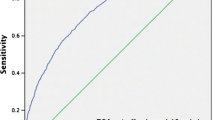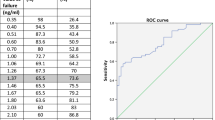Abstract
Purpose
An increase of the serum PSA-level is a sensitive in vitro marker for recurrent prostate cancer. However, it remains difficult to differentiate between local, regional or distant recurrent disease. The aim of this study was to assess the relationship between the detection rate of [11C]Choline-PET/CT and the serum PSA-level in patients with a biochemical recurrence of prostate cancer with the view towards localisation of recurrent disease.
Methods
Sixty-three patients (mean age, 68.8 ± 6.9; range, 45–83 years) with biochemical recurrence after primary therapy for prostate cancer were included in the analysis. Mean PSA-levels were 5.9 ± 9.7 ng/ml (range, 0.2–39 ng/ml; median, 2.15). Of the 63 patients, 17 were under anti-androgen therapy at the time of [11C]Choline PET/CT. Patients underwent a [11C]Choline-PET/CT study after injection of 656 ± 119 MBq [11C]Choline on a Sensation 16 Biograph PET/CT scanner.
Results
Of the 63 patients, 35 (56%) showed a pathological [11C]Choline uptake. The detection rate of [11C]Choline-PET/CT showed a relationship with the serum PSA-level: The detection rate was 36% for a PSA-value <1 ng/ml, 43% for a PSA-value 1–<2 ng/ml, 62% for a PSA-value 2–<3 ng/ml and 73% for a PSA-value ≥3 ng/ml. Anti-androgen therapy did not show a significant effect on the detection rate of [11C]Choline-PET/CT (p = 0.374).
Conclusion
As an important result our study shows that even for PSA-values <1.0 ng/ml the detection efficiency of [11C]Choline-PET/CT is 36%. Furthermore, the detection rate of [11C]Choline-PET/CT shows a positive relationship with serum PSA-levels in patients with biochemical recurrence of prostate cancer after primary therapy. Therefore, in these patients, [11C]Choline PET/CT allows not only to diagnose but also to localise recurrent disease with implications on disease management (localised vs systemic therapy).

Similar content being viewed by others
References
Freedland SJ, Presti JC Jr, Amling CL, Kane CJ, Aronson WJ, Dorey F, et al. Time trends in biochemical recurrence after radical prostatectomy: results of the SEARCH database. Urology 2003;61:736–41.
Han M, Partin AW, Zahurak M, Piantadosi S, Epstein JI, Walsh PC. Biochemical (prostate specific antigen) recurrence probability following radical prostatectomy for clinically localized prostate cancer. J Urol 2003;169:517–23.
Chism DB, Hanlon AL, Horwitz EM, Feigenberg SJ, Pollack A. A comparison of the single and double factor high-risk models for risk assignment of prostate cancer treated with 3D conformal radiotherapy. Int J Radiat Oncol Biol Phys 2004;59(2):380–5.
Roberts SG, Blute ML, Bergstralh EJ, Slezak JM, Zincke H. PSA doubling time as a predictor of clinical progression after biochemical failure following radical prostatectomy for prostate cancer. Mayo Clin Proc 2001;76:576–81.
Bott SR. Management of recurrent disease after radical prostatectomy. Prostate Cancer Prostatic Dis 2004;7:211–16.
Connolly JA, Shinohara K, Presti JC Jr, Carroll PR. Local recurrence after radical prostatectomy: characteristics in size, location, and relationship to prostate-specific antigen and surgical margins. Urology 1996;47:225–31.
Shekarriz B, Upadhyay J, Wood DP Jr, Hinman J, Raasch J, Cummings GD, et al. Vesicourethral anastomosis biopsy after radical prostatectomy: predictive value of prostate-specific antigen and pathologic stage. Urology 1999;54:1044–8.
Kramer S, Gorich J, Gottfried HW, Riska P, Aschoff AJ, Rilinger N, et al. Sensitivity of computed tomography in detecting local recurrence of prostatic carcinoma following radical prostatectomy. Br J Radiol 1997;70:995–9.
Sella T, Schwartz LH, Swindle PW, Onyebuchi CN, Scardino PT, Scher HI, et al. Suspected local recurrence after radical prostatectomy: endorectal coil MR imaging. Radiology 2004;231:379–85.
Coakley FV, Teh HS, Qayyum A, Swanson MG, Lu Y, Roach M 3rd, et al. Endorectal MR imaging and MR spectroscopic imaging for locally recurrent prostate cancer after external beam radiation therapy: preliminary experience. Radiology 2004;233:441–8.
Jager GJ, Barentsz JO, Oosterhof GO, Witjes JA, Ruijs SJ. Pelvic adenopathy in prostatic and urinary bladder carcinoma: MR imaging with a three-dimensional TI-weighted magnetization-prepared-rapid gradient-echo sequence. AJR Am J Roentgenol 1996;167:1503–7.
Oyen RH, Van Poppel HP, Ameye FE, Van de Voorde WA, Baert AL, Baert LV. Lymph node staging of localized prostatic carcinoma with CT and CT-guided fine-needle aspiration biopsy: prospective study of 285 patients. Radiology 1994;190:315–22.
Hoh CK, Schiepers C, Seltzer MA, Gambhir SS, Silverman DH, Czernin J, et al. PET in oncology: will it replace the other modalities? Semin Nucl Med 1997;27:94–106.
Hofer C, Laubenbacher C, Block T, Breul J, Hartung R, Schwaiger M. Fluorine-18-fluorodeoxyglucose positron emission tomography is useless for the detection of local recurrence after radical prostatectomy. Eur Urol 1999;36:31–5.
Nunez R, Macapinlac HA, Yeung HW, Akhurst T, Cai S, Osman I, et al. Combined 18F-FDG and 11C-methionine PET scans in patients with newly progressive metastatic prostate cancer. J Nucl Med 2002;43:46–55.
Morris MJ, Akhurst T, Osman I, Nunez R, Macapinlac H, Siedlecki K, et al. Fluorinated deoxyglucose positron emission tomography imaging in progressive metastatic prostate cancer. Urology 2002;59:913–8.
Schöder H, Herrmann K, Gonen M, Hricak H, Eberhard S, Scardino P, et al. 2-[18F]fluoro-2-deoxyglucose positron emission tomography for the detection of disease in patients with prostate-specific antigen relapse after radical prostatectomy. Clin Cancer Res 2005;11:4761–9.
Picchio M, Messa C, Landoni C, Gianolli L, Sironi S, Brioschi M, et al. Value of [11C]choline positron emission tomography for re-staging prostate cancer: a comparison with [18F]fluorodeoxyglucose-positron emission tomography. J Urol 2003;169:1337–40.
de Jong IJ, Pruim J, Elsinga PH, Vaalburg W, Mensink HJ. Preoperative staging of pelvic lymph nodes in prostate cancer by 11C-choline PET. J Nucl Med 2003;44:331–5.
Yoshida S, Nakagomi K, Goto S, Futatsubashi M, Torizuka T. 11C-choline positron emission tomography in prostate cancer: primary staging and recurrent site staging. Urol Int 2005;74:214–20.
Heinisch M, Dirisamer A, Loidl W, Stoiber F, Gruy B, Haim S, et al. Positron emission tomography/computed tomography with F-18-fluorocholine for restaging of prostate cancer patients: meaningful at PSA <5 ng/ml? Mol Imaging Biol 2006;8:43–8.
Schmid DT, John H, Zweifel R, Cservenyak T, Westera G, Goerres GW, et al. Fluorocholine PET/CT in patients with prostate cancer: initial experience. Radiology 2005;235:623–8.
Cimitan M, Bortolus R, Morassut S, Canzonieri V, Garbeglio A, Baresic T, et al. [(18)F]fluorocholine PET/CT imaging for the detection of recurrent prostate cancer at PSA relapse: experience in 100 consecutive patients. Eur J Nucl Med Mol Imaging 2006;33:1387–98.
Boccon-Gibod L, Djavan WB, Hammerer P, Hoeltl W, Kattan MW, Prayer-Galetti T, et al. Management of prostate-specific antigen relapse in prostate cancer: a European Consensus. Int J Clin Pract 2004;58:382–90.
Pound CR, Partin AW, Eisenberger MA, Chan DW, Pearson JD, Walsh PC. Natural history of progression after PSA elevation following radical prostatectomy. JAMA 1999;281:1591–7.
Anonymous. Consensus statement: guidelines for PSA following radiation therapy. American Society for Therapeutic Radiology and Oncology Consensus Panel. Int J Radiat Oncol Biol Phys 1997;37(5):1035–41.
Hara T. 11C-choline and 2-deoxy-2-[18F]fluoro-D-glucose in tumor imaging with positron emission tomography. Mol Imaging Biol 2002;4:267–73.
Lee CT, Oesterling JE. Using prostate-specific antigen to eliminate the staging radionuclide bone scan. Urol Clin North Am 1997;24:389–94.
Silverman JM, Krebs TL. MR imaging evaluation with a transrectal surface coil of local recurrence of prostatic cancer in men who have undergone radical prostatectomy. AJR Am J Roentgenol 1997;168:379–85.
Oyama N, Miller TR, Dehdashti F, Siegel BA, Fischer KC, Michalski JM, et al. C-11-Acetate PET imaging of prostate cancer: detection of recurrent disease at PSA relapse. J Nucl Med 2003;44:549–55.
Partin AW, Pearson JD, Landis PK, Carter HB, Pound CR, Clemens JQ, et al. Evaluation of serum prostate-specific antigen velocity after radical prostatectomy to distinguish local recurrence from distant metastases. Urology 1994;43:649–59.
Okotie OT, Aronson WJ, Wieder JA, Liao Y, Dorey F, DeKernion JB, et al. Predictors of metastatic disease in men with biochemical failure following radical prostatectomy. J Urol 2004;171:2260–4.
Anscher MS. Salvage radiotherapy for recurrent prostate cancer: the earlier the better. JAMA 2004;291:1380–2.
Roach M III, DeSilvio M, Lawton C, Uhl V, Machtay M, Seider MJ, et al. Phase III trial comparing whole-pelvic versus prostate-only radiotherapy and neoadjuvant versus adjuvant combined androgen suppression: Radiation Therapy Oncology Group 9413. J Clin Oncol 2003;21:1904–11.
Swanson GP, Thompson IM, Basler J. Treatment options in lymph node-positive prostate cancer. Cancer 2006;106:2531–9.
Wachter S, Tomek S, Kurtaran A, Wachter-Gerstner N, Djavan B, Becherer A, et al. C-11-acetate positron emission tomography imaging and image fusion with computed tomography and magnetic resonance imaging in patients with recurrent prostate cancer. J Clin Oncol 2006;24:2513–9.
Coleman R, DeGrado T, Wang S, Baldwin S, Orr M, Reiman R, et al. 9:30–9:45. Preliminary evaluation of F-18 Fluorocholine (FCH) as a PET tumor imaging agent. Clin Positron Imaging 2000;3:147.
Torizuka T, Kanno T, Futatsubashi M, Okada H, Yoshikawa E, Nakamura F, et al. Imaging of gynecologic tumors: comparison of [11C]Choline PET with [18]F-FDG PET. J Nucl Med 2003;44:1051–6.
Wyss MT, Weber B, Honer M, Spath N, Ametamey SM, Westera G, et al. [18F]Choline in experimental soft tissue infection assessed with autoradiography and high resolution PET. Eur J Nucl Med Mol Imaging 2004;31:312–6.
van Waarde A, Jager PL, Ishiwata K, Dierckx RA, Elsinga PH. Comparison of Sigma-ligands and metabolic PET tracers for differentiating tumor from inflammation. J Nucl Med 2006;47:150–4.
Author information
Authors and Affiliations
Corresponding author
Rights and permissions
About this article
Cite this article
Krause, B.J., Souvatzoglou, M., Tuncel, M. et al. The detection rate of [11C]Choline-PET/CT depends on the serum PSA-value in patients with biochemical recurrence of prostate cancer. Eur J Nucl Med Mol Imaging 35, 18–23 (2008). https://doi.org/10.1007/s00259-007-0581-4
Received:
Accepted:
Published:
Issue Date:
DOI: https://doi.org/10.1007/s00259-007-0581-4




